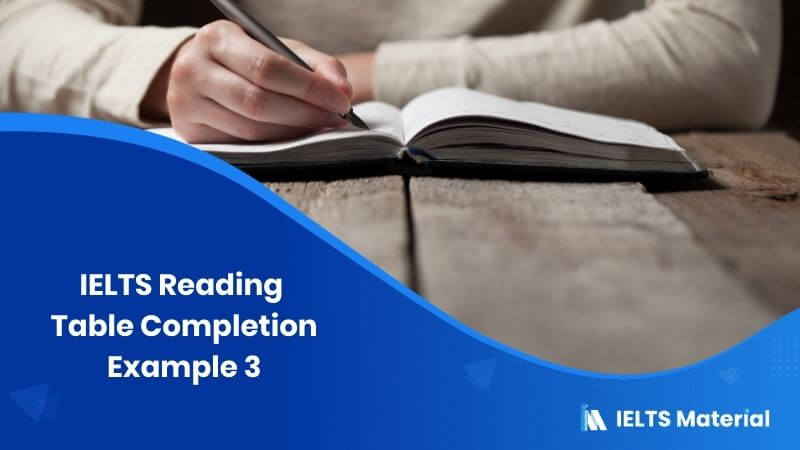IELTS Reading Table Completion Example 3
Table of Contents

Limited-Time Offer : Access a FREE 10-Day IELTS Study Plan!
The IELTS Academic Test will assess your reading capabilities when you encounter an academic essay or extract. This means that to score well on this task, you must polish your reading comprehension skills through consistent and daily practice. The best way to do this is by studying sample questions and solutions.
The IELTS Reading table completion question like Disorders: An Overview is designed to assess the candidate’s ability to understand the passage’s context and organize the information logically in a tabular format. You must select the appropriate response from the provided passage and complete it.
Disorders: An OverviewAutistic Spectrum Disorder Children with Autistic Spectrum Disorder have difficulty understanding what other people are saying, need help to play with other children, enjoy routines and find unfamiliar situations difficult. People with Autistic Spectrum Disorder can be good at creative activities like art, music and poetry. They can concentrate on one thing for a long time no they can become very good at something that they like doing. ADHD – Attention Deficit People with ADHD have three types of problems. Overactive behaviour (hyperactivity), impulsive behaviour and difficulty pitying attention. Children with ADHD are not just very active but have a wide range of problem behaviours which can make them very difficult to care for and control. Those who have ADHD often find it difficult to fit in at school. They may also have problems getting on with other children. Some children have significant problems with concentration and attention but are not necessarily overactive or impulsive. These children are sometimes described as having Attention Deficit Disorder (ADD) rather than ADHD. ADD can easily be missed because the child is quiet and dreamy rather than disruptive. ADHD is not related to intelligence. Children with all levels of ability can have ADHD. Schizophrenia Schizophrenia is a diagnosis given to some people who have severely disrupted beliefs and experiences. During an episode of schizophrenia, a person’s experience and interpretation of the outside world is disrupted – they may lose touch with reality, see or hear things that are not there and act in unusual ways in response to these ‘hallucinations’. An episode of schizophrenia can last for several weeks and can be very frightening. The causes are unknown but episodes of schizophrenia appear to be associated with changes in some brain chemicals. Stressful experiences and some recreational drugs are sometimes thought to trigger an episode. Depression Depression describes a range of moods, from the low spirits that we all experience, to a severe problem that interferes with everyday life. The latter type, sometimes referred to as “clinical depression”, is defined as its “a persistent exaggeration of the everyday feelings that accompany sadness”. If you have severe depression you may experience low mood, loss of interest and pleasure as well as feelings of worthlessness and guilt. You may also experience tearfulness, poor concentration, reduced energy, reduced or increased appetite, changes in weight, sleep problems and anxiety. You may even feel that life is not worth living and plan or attempt suicide. |
Questions 1-4
Write your answers in the blank spaces next to 1-4 on your answer sheet.
Write NO MORE THAN THREE WORDS from the passage for each answer.
| Disorder | Personality Trait Exhibited by Sufferer |
| Autism Spectrum Disorder | May excel in activities of a 6…………………nature |
| Attention Deficit Disorder | May appear 7………………………. |
| Schizophrenia | May respond to experiencing episodes of the disease by behaving in very 8 ……………………….. |
| Depression | May experience feelings of futility that lead to thoughts of 9………………………. |
Answers
|
Explanation
Unlock Explanation
| For the first question, the answer can be found in the first paragraph; “People with Autistic Spectrum Disorder can be good at creative activities like art, music and poetry.”
The second answer can be found in the second para; “ADD can easily be missed because the child is quiet and dreamy’. The third answer is available in the third paragraph; “they may lose touch with reality, see or hear things that are not there and act in unusual ways in response to these hallucinations” For the fourth question, the answer is available in the fourth paragraph; ‘You may even feel that life is not worth living, and plan or attempt suicide.’ |
Also check:
Practice IELTS Reading based on question types

Start Preparing for IELTS: Get Your 10-Day Study Plan Today!
Recent Articles

Nehasri Ravishenbagam

Haniya Yashfeen

Haniya Yashfeen

Haniya Yashfeen




Post your Comments